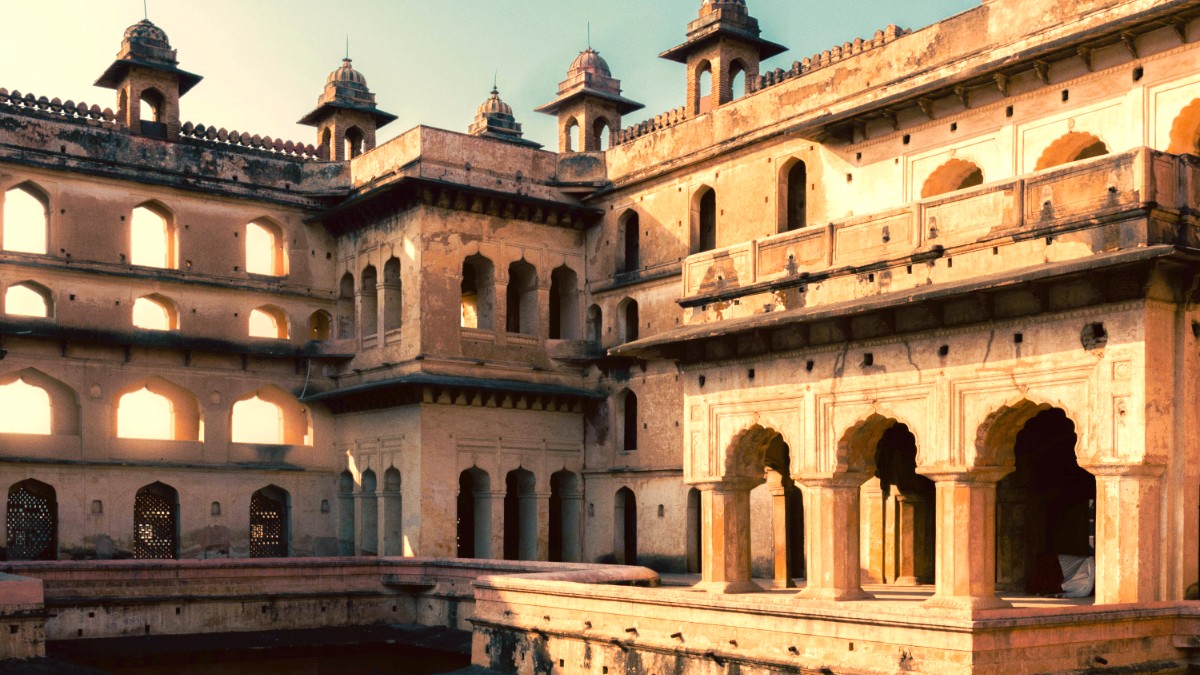
Madhya Pradesh And Chhattisgarh, India
Orchha’s climate features three distinct seasons, each offering a different experience. Temperatures range from 25°C to 45°C (77°F to 113°F) in summer, 25°C to 35°C (77°F to 95°F) during monsoon, and 8°C to 25°C (46°F to 77°F) in winter.
Winter offers the most pleasant conditions for exploration, with mild days and cool nights. Monsoon season makes the landscape green but brings heavy rains and humidity. Summer is hot and dry, with very high temperatures.
During the monsoon (July-September), heavy rainfall causes the Betwa River to swell. This may lead to localized flooding in low-lying areas, and some unpaved roads might be difficult. River activities depend on safe water levels.
Summer temperatures (March-June) are very high. Protect against heatstroke and dehydration. Stay indoors during the hottest parts of the day.
High Heat or Heavy Rain
Some outdoor activities may be restricted or uncomfortable during extreme weather. Plan accordingly.
Stay hydrated in summer. Monitor local weather reports during monsoon. Seek shelter during storms.
Fewer Crowds, Better Rates
Potential for lower prices on accommodation and tours outside peak season.
March can bring rising temperatures; September still has humidity and occasional rain.
Optimal Weather, Full Access
Enjoy ideal conditions for sightseeing, heritage walks, and river activities.
Higher demand and crowds, especially during holidays. Book accommodation in advance.
Most foreign nationals need an Indian visa. The e-Visa (Electronic Visa) is common for tourism. Apply online at least four days before arrival. The e-Visa grants 60 to 180 days with various entry options. Upon approval, receive an Electronic Travel Authorization (ETA) via email. Print this ETA for arrival. For nationalities ineligible for e-Visa, apply at an Indian Embassy or Consulate in your home country. This involves physical documents and possibly interviews. Begin well in advance, as this process takes several weeks.
Your passport must be valid for at least six months beyond your departure date and have two blank pages. Provide recent passport-sized color photographs (for regular visa) or upload a digital photo (for e-Visa). Complete the visa application form. Proof of onward/return travel, accommodation, and sufficient funds are also helpful. No special permits are needed for Orchha.
Online application for quick processing. IVisa or VisaHQ offer application services.
Six months beyond departure, with two blank pages.
E-Visa fees vary by nationality. Immigration includes fingerprinting and a photograph.
Yellow Fever vaccination certificate if arriving from risk countries. Check current Indian Ministry of Health guidelines.
Not for Orchha. Some other Indian regions may have specific permit needs.
India uses the Indian Rupee (INR). Exchange rates change, so check current values before traveling. For example, 1 USD is approximately 83 INR, and 1 EUR is around 90 INR (as of late 2023 or early 2024).
Exchange currency at authorized money changers or banks. ATMs are increasingly available in Orchha and widely present in larger towns like Jhansi. Notify your bank of your travel plans to avoid card suspension. Larger hotels and some restaurants accept credit cards, but cash is preferred for street food, smaller shops, and local transport. Carry small denominations for convenience.
Tipping is not obligatory but is appreciated in India, specifically in the service industry. For restaurants, consider 5-10% if no service charge is included. For bellhops or housekeeping, INR 50-100. Drivers might receive INR 100-200 for a full day. Guides may receive INR 200-500. Small amounts (INR 10-50) for porters at temples.
Expect higher expenses for premium accommodations, fine dining, and private transport. Accommodation may range from INR 6,000 - 15,000+ (USD 72-180+), meals from INR 1,800 - 4,000+ (USD 22-48+), and private cars from INR 1,500 - 3,000+ (USD 18-36+).
This section outlines vaccination advice, common health concerns, safety protocols, and emergency contacts for your journey to Orchha.
A Yellow Fever vaccination certificate is necessary if you arrive from or transit through a country with a risk of Yellow Fever transmission. Check current Indian Ministry of Health & Family Welfare guidelines for the most recent list of affected countries. Consult a travel doctor 4-6 weeks before your trip for recommended vaccinations, including Hepatitis A & B, Typhoid, Rabies (if around animals), and Japanese Encephalitis (seasonal/rural).
Common travel health concerns include traveler's diarrhea, mosquito-borne illnesses (Dengue, Chikungunya, Malaria), heatstroke, dehydration, and sunburn. Prevention strategies are below.
Medical facilities in Orchha are local clinics. For serious emergencies, travel to Jhansi (approx. 30 minutes away) for larger hospitals. Dial 112 for all-in-one emergency services (Police, Fire, Ambulance) across India.
Jhansi has more advanced medical care.
Orchha's facilities are basic for minor issues.
Drink only bottled water with a sealed cap, or water that has been boiled or filtered. Avoid tap water, even for brushing teeth. Consider a Portable filter bottle. Eat hot, freshly cooked food. Avoid raw salads or unpeeled fruits from street vendors. Wash hands frequently.
Stick to well-cooked, hot food.
Avoid raw salads, unsealed bottled water, and ice.
Orchha is generally safe. Petty theft can occur in crowded areas, less common here than in larger cities. Be cautious of touts; agree on prices beforehand. Walk in well-lit areas at night. Purchase comprehensive Travel insurance covering medical emergencies, evacuation, and lost luggage. Consider SafetyWing or Insubuy.
Orchha typically presents low crime rates.
Avoid isolated spots, especially when alone at night.
| Category | Details | Action |
|---|---|---|
| Natural Disasters | Flooding during heavy monsoon (July-Sep), extreme heatwaves in summer (Apr-Jun). | Take precautions against heatstroke, monitor local weather reports. |
| Crime Concerns | Petty theft (pickpocketing) in crowded areas; scams from touts. | Secure valuables, agree on prices beforehand, consider Anti-theft bags. |
| Emergency Contacts | All-in-one helpline: 112. Police: 100. Fire: 101. Ambulance: 102. | Keep embassy/consulate contact info and hotel details readily accessible. |